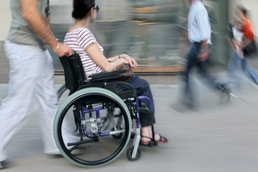Young spinal cord patients depressed and isolated in elderly care homes

Young spinal cord injured patients are spending up to two years living in care homes for the elderly, leaving them feeling depressed and isolated, according to a new study.
Up to one in five of the 1,200 people in the UK paralysed each year are moved to a care home following rehabilitation while they wait for their existing homes to be renovated for wheelchair use or for suitable accommodation to be found.
Around 70 per cent of spinal cord injury patients are men, and many are under 40 years old.
Dr Brett Smith of Loughborough University, carried out a study of spinal cord patients aged 24 and over living in care homes and found a general lack of belonging, widespread depression, feelings of isolation, a loss of hope, suicidal thoughts, and uncertainty of the future.
Dr Smith said: “Through extensive rehabilitation, spinal cord patients are given the resources to live independently after their life changing trauma. For the 20 per cent who find themselves moved into care homes – albeit on a temporary basis – the impact on their physical development, health and psychological wellbeing can be devastating and can even lead to attempted suicide.”
Alex Rankin, director of services at spinal injury charity, Aspire, which commissioned the study said: “The work by Dr Brett Smith and his team will go a long way in showing the full extent of the damage that is caused by placing people into unsuitable housing.
“With this evidence, Aspire will be better able to help people with spinal cord injuries get the accommodation they need, giving them the independence and opportunities in life that most of us take for granted.”
He added: “Every eight hours in the UK, someone is paralysed by spinal cord injury. There is no warning, no time to prepare, and no cure for the damage done.
“With so few properties in the UK being accessible to wheelchair users, it’s no surprise that many people find they cannot return to their own home when they leave hospital. Worryingly, every year, hundreds of people with spinal cord injuries are forced into totally inappropriate housing situations; robbing them of their independence at the very time they are trying to rebuild their lives.”
Dr Smith attended an event at the Houses of Parliament on Monday with the charity Aspire to highlight the plight of the many spinal cord injured people who spend up to two years living in elderly care homes.
Dr Smith, from Loughborough University's School of Sport, Exercise and Health Sciences, called for local authorities to do more to adequately house those with spinal injuries, and to speed up the time it takes to get them into an accessible, suitable home once they leave hospital.
Latest News
 29-Jul-24
Dementia Bus gives carehome.co.uk staff insight into life with dementia
29-Jul-24
Dementia Bus gives carehome.co.uk staff insight into life with dementia
 01-Mar-24
Find out the top care homes in 2024
01-Mar-24
Find out the top care homes in 2024
 21-Mar-23
UK's top care homes in 2023 revealed
21-Mar-23
UK's top care homes in 2023 revealed
 03-Jan-23
carehome.co.uk launches free care helpline
03-Jan-23
carehome.co.uk launches free care helpline
 13-Dec-22
5 mins with Emily Whitehurst, chief operating officer for Constantia Healthcare
13-Dec-22
5 mins with Emily Whitehurst, chief operating officer for Constantia Healthcare